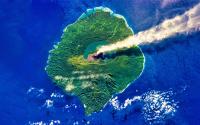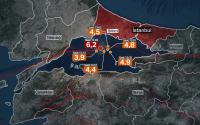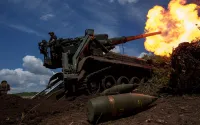Published on Wednesday, April 7, 2004 by the Associated PressBassem Mroue and Abdul-Qader Saadi
FALLUJAH - U.S. Marines in a fierce battle for this Sunni Muslim stronghold fired rockets that hit a mosque compound filled with worshippers today, and witnesses said as many as 40 people were killed. Shiite-inspired violence spread to nearly all of the country.
The fighting in Fallujah and neighbouring Ramadi, where commanders confirmed 12 Marines were killed late Tuesday, was part of an intensified uprising involving both Sunni and Shiites that now stretched from Kirkuk in the north to the far south.
An Associated Press reporter in Fallujah saw cars ferrying the dead and wounded from the Abdul-Aziz al-Samarrai mosque. Witnesses said a helicopter fired three missiles into the compound, destroying part of a wall surrounding the mosque but not damaging the main building.
The strike came as worshippers had gathered for afternoon prayers, witnesses said. Temporary hospitals were set up in private homes to treat the wounded and prepare the dead for burial.
Until the mosque attack, reports had at least 30 Americans and more than 150 Iraqis dead in fighting for Ramadi and Fallujah.
Anti-American violence intensified and spread to cities in northern Iraq on Wednesday. A U.S. helicopter was forced down after being hit by small arms fire, and a Marine commander confirmed 12 of his men had been killed in fighting west of Baghdad.
Scores of Iraqis also have been wounded, as mosques called for a holy war against Americans and women carried guns in the streets.
American and allied forces fought both Sunni and Shiite Muslim militants nationwide in a continuation of the heaviest fighting since Baghdad fell to U.S. troops a year ago this week.
Marines fought for control in the Sunni Triangle cities of Ramadi and Fallujah, and soldiers battled Shiite militiamen in cities stretching from near Kirkuk in the largely Kurdish north to holy cities in the Shiite heartland to the south of Baghdad.
U.S. Marines have vowed to pacify the violent towns of Ramadi and Fallujah that had been a centre of the guerrilla insurgency seeking to oust the U.S.-led occupation force. The 12 Marines were killed Tuesday in Ramadi, where Maj. Gen. James Mattis, 1st Marine Division commander, said his forces still were fighting insurgents that included Syrian mercenaries along a one-mile front.
Sixteen children and eight women were reported killed when warplanes struck four houses late Tuesday, said Hatem Samir, a Fallujah Hospital official.
A U.S. helicopter was hit by small arms fire and forced down in Baqouba, 30 miles north of Baghdad, the military said, as American soldiers fought militiamen of fiery anti-U.S. Shiite cleric Moqtada al-Sadr, whose forces have been responsible for much of the violence other than in Ramadi and Fallujah.
No one was hurt aboard the OH-58 Kiowa chopper, and the military planned to transport it to a nearby base by truck, a U.S. official in Baghdad said on condition of anonymity.
Ukrainian-led forces and al-Sadr’s al-Mahdi Army clashed in the city of Kut, southeast of Baghdad, overnight, and at least 12 Iraqis were reported killed and 20 wounded, hospital officials said. Witnesses reported the gunmen killed a British civilian working for a foreign security company.
The Ukrainian Defense Ministry said its troops were forced to evacuate Kut early today after al-Sadr forces hit the position with mortar fire during the night.
“There were no Ukrainian casualties, but several dozen militants were killed,” said Defence Ministry spokesperson Lt. Col. Andriy Lysenko.
In a significant expansion of the fighting, Iraqis protesting in solidarity with Fallujah residents clashed with U.S. troops in the northern town of Hawijah, near Kirkuk. Eight Iraqis were killed, and 10 Iraqis and four Americans were wounded, police said.
In Baghdad, a top American general said the United States would press the offensive.
“The coalition and Iraqi security forces will continue deliberate, precise and powerful offensive operations to destroy the al-Mahdi Army throughout Iraq,” Brig. Gen. Mark Kimmitt, the U.S. military’s deputy head of operations, told reporters in Baghdad.
He called for the surrender of al-Sadr, who is named in an arrest warrant for involvement in the murder of a rival Shiite cleric almost a year ago. “If he wants to calm the situation ... he can turn himself in to a local Iraqi police station and he can face justice,” Kimmitt said.
Despite the call, there was no sign al-Sadr’s forces had eased their attacks:
![]() Shooting was heard as his militiamen took the streets of Baqouba and blasted the governor’s office with rocket-propelled grenades.
Shooting was heard as his militiamen took the streets of Baqouba and blasted the governor’s office with rocket-propelled grenades.
![]() Militiamen battled Spanish soldiers in Najaf, south of Baghdad. An Iraqi taxi driver was killed in the crossfire, a hospital official said.
Militiamen battled Spanish soldiers in Najaf, south of Baghdad. An Iraqi taxi driver was killed in the crossfire, a hospital official said.
![]() Clashes erupted overnight in Baghdad’s Sadr City, killing four Iraqis and wounding seven others, doctors said.
Clashes erupted overnight in Baghdad’s Sadr City, killing four Iraqis and wounding seven others, doctors said.
![]() Militiamen traded fire with Polish troops in Karbala overnight, killing two Iranian tourists, witnesses said.
Militiamen traded fire with Polish troops in Karbala overnight, killing two Iranian tourists, witnesses said.
![]() Gunmen attacked a police car Tuesday night in Youssifiya, south of Baghdad, killing two policemen.
Gunmen attacked a police car Tuesday night in Youssifiya, south of Baghdad, killing two policemen.
Al-Sadr had urged Iraqis to rise up against the U.S. occupation and vowed to die rather than be captured. “America has shown its evil intentions, and the proud Iraqi people cannot accept it,” he said in a statement. “They must defend their rights by any means they see fit.’’
The fighting began at the start of the week when they surrounded Fallujah, promising to capture or kill those responsible for the brutal slayings and mutilations of four American civilian whose bodies were hung from a Euphrates River bridge last week.
On Tuesday, however, insurgents opened a new front with a bloody attack on Marines in the nearby town of Ramadi.
Gunmen hiding in Ramadi’s main cemetery opened fire on U.S. patrols, sparking a gunbattle in alleys near the governor’s palace, witnesses said, adding that at least two Iraqis were killed.
Signs were emerging of growing sympathy between Sunni Muslim insurgents and al-Sadr’s Shiite movement. In mainly Sunni Ramadi, portraits of al-Sadr were posted on government buildings, schools and mosques, along with graffiti praising him for his “heroic deeds” and “valiant uprising against the occupier.’’
Iraq’s Shiite majority has largely avoided anti-U.S. violence, shunning al-Sadr’s virulent anti-U.S. rhetoric as well as the insurgency led by Sunnis in central Iraq. U.S. officials have expressed concern that al-Sadr could start cooperating with the Sunni guerrillas.
With fighting intensifying ahead of the June 30 handover of power to an Iraqi government, Secretary of Defense Donald H. Rumsfeld said American commanders in Iraq would get additional troops if needed. None has asked so far, he said.
“They will decide what they need, and they will get what they need,” Rumsfeld said.
U.S. authorities launched their offensive against al-Sadr and his militia after a series of weekend uprisings in Baghdad and cities and towns to the south that took a heavy toll in both American and Iraqi lives.
The fight against al-Sadr, who has drawn backing from young and impoverished Shiites with rousing sermons demanding a U.S. withdrawal, sent his black-garbed militiamen against coalition troops Sunday, Monday and Tuesday.
With confirmation of the 12 dead Marines, the American death toll since the war was at least 626.
http://www.commondreams.org/cgi-bin/print.cgi?file=/headlines04/0407-06.htm






